- Home
- Shirley McKay
Time and Tide Page 4
Time and Tide Read online
Page 4
‘You might call it providential,’ Hew suggested.
‘Aye,’ agreed the baxter. ‘Like a gift from God.’
‘The problem though,’ Hew pointed out, ‘is that she is not yours.’
‘That is the rub,’ James Edie said, ‘for if we knew who owned her, we might buy her squarely, for the common good.’
‘Or else,’ said Patrick Honeyman, who lacked his colleague’s subtlety, ‘we might have control of her, in some other way.’
James Edie glanced at him, a quick and warning look. ‘We do not flout the law, but seek to understand it,’ he insisted. ‘The windmill’s place of origin remains a mystery. The ship is called the Dolfin – that is the porpoise, or the delfin fish, in Dutch, and not, as we suppose, the king of France. And yet she has not come here from our staple at Campvere. She was not expected, and no one in the town here kens aught about her fraught. Then since she is a wreck, we hoped that you might tell to us the process of the law. For some say that the town has title to the wreck, and others, that the whole is forfeit to the Crown. Pray, sir, which is true?’
‘In a sense,’ Hew considered, ‘neither and both. The shipwrack law is clear enough. In principal, the admiral decides, for shipwrack must be brought before his court. One part of the profit falls to the admiral, another to the Crown, and the third to any heritor who comes to claim his share.’
‘Then nothing to the town? But surely, when the town has gone to trouble and expense . . .’ Honeyman objected.
Hew shook his head. ‘I come to that. For often does the practice differ from the principle, and commonly the admiral will recompense the town. He is, in truth, quite likely to allow the town the windmill, since the cost of its recovery might well exceed its worth. However,’ he went on, ‘there is one provision. The law of shipwrack is reciprocal. Strangers wrecked upon our shores are treated here as they treat us, if we are lost to them. So if it comes from such a place, as returns our wrecks to us, then the cargo still belongs to the place from where it comes. If she is a Flemish ship, then they will have a claim on her. They have a year and a day in which to seek her out. If no one comes to claim her, then she will be shipwrack, and forfeit, as before.’
‘A year and a day?’ repeated Honeyman, incredulous. ‘It is a traveller’s tale!’
‘It is, precisely, that,’ conceded Hew. ‘I should caution you, perhaps, that to cunningly conceal her, is against the law. There is, it seems to me, a further possibility, that she may be a casualty of the religious wars, and was taken from the Dutch, by Spanish hands, for that might well explain why she has drifted from her course. In which case, she is forfeit to the Crown.’
‘And we might have some hope of her, by grace of the admiral?’ suggested Patrick Honeyman.
Hew agreed, ‘You might.’
Honeyman was satisfied. ‘Then it is most likely that may prove the case. I’ll warrant that the beggar had a swarthy look.’
‘Blackish, right enough,’ James Edie echoed doubtfully. ‘And yet . . .’
‘What beggar do you mean?’ asked Hew.
‘Yon Fleming, fishman, limmar, loun, they fetched aff fae the ship,’ Honeyman expanded. ‘A Spaniard, to be sure.’
‘Your pardon,’ Hew persisted. ‘Do you say there was a sailor saved?’
‘Of course there was,’ said Honeyman, perplexed at his stupidity. ‘Surely, ye must ken of it. The beggar that had crept into the windmill, that’s lying now, forfochten, in Maude’s feather bed. For that is why we wait here, in hopes he will wake up. Though little hope of that, afore the morrow’s morn.’
‘Ah! That changes everything,’ Hew capitulated. ‘For in that case, the law does not apply. If any living creature has survived the storm, the ship cannot be claimed as wreck. It need not be a man; the shipman’s dog or cat is sufficient for the rule. And you are well advised to keep your salvage safe, for anything you take will count as theft.’
‘Then we can have no hope of it?’ the deacon answered heavily, a glower of disappointment shadowing his face.
‘Your hope is that your sailor is owner of the windmill, and he may choose to sell it, for the cost of its recovery. Tis likely, though, he has already sold it, and it is expected somewhere else,’ concluded Hew.
‘Yet suppose,’ said Patrick Honeyman, grasping still at straws, ‘supposing that he does not last the night? Supposing that your man, or shipman’s dog, or cat, is taken off alive and does not last the night? I pray you, sir, what happens in that case?’
Hew gave a little thought to this. ‘In truth, I cannot say,’ he allowed at last. ‘In principle, the ship would not be shipwrack, even if he died, if he was taken living from the ship. Tis possible that nonetheless, the courts would claim it quietly, assuming that there was no notion of foul play. For such a case would call for closer scrutiny. It is a crime, I need not say, to leave a shipwrecked sailor to a lonely death.’
‘I do not understand,’ Christie Boyd complained, ‘Will we have the mill? Or won’t we have the mill?’
‘I cannot rightly say.’ Hew stood to take his leave. ‘Nor can I help you more. These are strange events.’
‘They are indeed,’ James Edie answered thoughtfully. ‘And we are much obliged to you. The waters here are deep. And time alone will show us up the catch.’
Chapter 3
A Miller’s Tale
Hew arrived at Kenly Green as the light began to fade. He slipped down from Dun Scottis, coming to the trees, and wandered through the gardens to the house. Someone had begun to clear the broken branches, smoothing ragged edges and raking up the leaves. The hawthorn and the holly trees had suffered in the storm. In Meg’s walled garden, too, the hands had stripped and trimmed; the gillyflowers tied back were oddly neat and desolate. The damp earth smelled of mushrooms. Hew thought of Meg returning, bairn in arms, for lavender and primroses, and blaeberries and plums, but found he could not picture them. An apple basket lay forgotten underneath the trees. He gathered up the windfalls and took the basket with him to the house. Servants flitted out like moths to meet him on the path; his horse and saddle blanket, boots and coat and hat were taken from him, taken care of, fed and watered, brushed and folded, stacked and hung on pegs, the lanterns in the doorway pricking out the gloom.
A kitchen lass retrieved the basket with a cry, ‘You didna want to dae that, sir!’ I did not want you to, was what she meant. The pippins would be pulped, in pottages and pies, conforming to a pattern that would shape the winter months, and according to a process he was not supposed to see.
‘Will you want your supper now?’ the kitchen lass inquired.
‘I had a fish at dinnertime,’ he said apologetically.
‘A fish? But it is not a fish day!’ It was a plainly a reproof, for a flouting of convention that caused the girl offence. It was bringing home the apple basket, on a grander scale.
‘That was the least of the strangeness,’ Hew told her, ‘on what was the strangest of days.’
He felt a draught of loneliness when she responded blankly, ‘Will you take your supper then with Master Nicholas?’ He sensed a cool indifference in her lack of curiosity, her wish to be restricted to the business of the house.
‘Aye, why not?’ he sighed. ‘How does he now?’
‘No worse than when you saw him last. He is in the library.’
Hew nodded. ‘That is good.’
‘There is a pippin tart.’
‘Even better,’ he agreed.
He watched her as she disappeared, returning to the house an inner life, which did not belong to him.
Hew climbed the turnpike staircase to the place where he had come most often, since his father’s death. He had not replaced the tapestries or carpets in the hall, which were left to Meg, and though the fire and lanterns were kept lit, he rarely used the room. Instead, he spent a little money on the library, on caquetoires of walnut wood and bolsters worked in silk, with patterned leaves in greens and gold and flowers of mauve and blue. There were matching walnut al
mories, or cabinets, for books, and a knotted table carpet, fringed in scarlet wool. In part, it was for Nicholas, who lived on as librarian, in quietness and solitude, through frail and failing health.
Hew found his old friend reading by the fire, curled up in a resting chair. Matthew Cullan’s hunting hound lay napping at his side, twitching as it slept. Hew closed the shutters one by one, lighting all the candle wicks, that cast a honeyed shadow on the stone. The grey dog blinked, and yawned, showing yellow teeth. Nicholas set down his book. ‘I did not hear you come in. How is Meg?’
‘No news as yet,’ said Hew, pulling up a chatter-chair, ‘nor showing of the child. Meg is agitated, flustered in the wind, and Giles is out of sorts. The world is turned on end, and wild and strange today.’
Nicholas said quietly, ‘I have felt it too.’ He hesitated, searching for the words. ‘You will think it foolish; I have had a premonition.’
Nicholas was not inclined to frantic fears. His close and clear precision in enforcing rational argument was something that his friend had come to trust. Hew wondered if it was the sickness, winding slick and sinuous, starting to infect his mind.
‘Tell me.’
‘I dreamt that you were dead. You were thrown from your horse and fallen from the cliff, like King Alexander, at Pettycur.’ Nicholas had turned away, laying bare his heart, as he covered up his face.
Hew answered awkwardly, ‘Then it was a dream, that has no place or business in your waking fears. You know my horse better than that, than to think he would venture abroad through the storm. We slept at the West Port last night. There was no way of sending word.’
‘There was, of course, no need to,’ Nicholas said quickly.
‘No,’ acknowledged Hew. He sensed his friend’s embarrassment, and let the matter rest, picking up the book that Nicholas had dropped. ‘What have you been reading?’ he inquired.
Nicholas confessed, ‘It is a nursery tale, about the daughter of a miller, who is ravished by a duke. Although it may be frivolous, it has a certain charm. The book is Painter’s Palace of Pleasure, and belongs to Meg. It serves as a distraction in the quiet hours.’ Nicholas did not sleep well, and suffered aches and tremors in his limbs.
‘Then there is little wonder you are given to imaginings, for you have spent too long in Painter’s pleasure house. A philippic of Cicero will prove a sharp phlebotomy, and cure you of these ills. I prescribe one, straight away, turned into Greek,’ said Hew, with mock severity. His change of temper proved effective. Nicholas returned his smile. ‘Your prescription has a sting.’
‘No more than you deserve, for all your soft indulgences,’ said Hew. ‘Yet if that proves too poignant, whet your wits on this. I have an inquisition here to chase away your fantasies, if you will turn your mind to it. And, by some fate or fortune, it is a miller’s tale.’
‘What is it, then? A paradox?’ asked Nicholas, intrigued.
‘Of sorts. The pith of it is this. A man is in a windmill, and the mill is on a ship, the one inside the other, like a grocer’s nesting box. What does it signify?’
Nicholas considered this. ‘A circle, I suppose. Or else the world,’ he guessed.
‘Your reason, if you will?’ commanded Hew.
‘For man is a circle, and the windmill turns a circle, and the ship is a windmill, that circles round the world,’ his friend expounded, ‘like the English pirate, Francis Drake.’
‘I like that,’ Hew approved. ‘But why is man a circle?’
‘Because he is a little world, a microcosm.’
‘So he is. Ingenious. You have proved your wit, though you have not solved the problem.’
‘Then I am perplexed. What is the answer to the riddle of the ship?’ Nicholas asked curiously.
‘There is no answer,’ Hew admitted, ‘for there is no paradox. The ship is not a riddle, but a wreck. It washed up in the storm last night, on the rocks by Kinkell Braes.’ He told his friend the story, ending with his meeting with the baxters at the inn.
Nicholas said soberly, ‘A strange and tragic tale. You say the wreck was found at Kinkell Braes? That’s where I saw you falling in my dream.’
‘Tis likely that some ghost of it came howling on the storm; the wind has many voices that reach to us in sleep. Yet I am here, and safe, so put it from your mind,’ instructed Hew.
They sat in silence for a while, gazing at the fire, until the serving girl appeared with supper on a tray, and brought a busy brightness to the room, laying out the plate and pewter cups. She set a chafing dish of onions, leeks and cheese to toast upon the coals, with a wheaten loaf for dipping into it. The dish was closely followed by the tart of pulped green apples spiked with cloves, by white and claret wines, and a rose and almond cream.
Hew broke off a piece of bread. The loaf was fine white manchet, and bore the baxter’s signature, a gathered sheaf of corn. ‘Where do we buy our bread?’ he asked the serving lass.
‘This bread, sir? The manchet? The boy brings it from town.’
‘Aye, but from which baxter?’
‘From the bailie, James Edie, that bakes the best bread. That is his mark. Is it not to your liking, sir?’ the girl returned, confused.
‘I like it well enough,’ he answered, buttering the crust and handing it to Nicholas. ‘Does all the bread here come from James Edie?’
‘Not all of it. The manchet is for you and Master Nicholas, when you are at home.’
‘And when I’m not at home?’
‘Then he makes do wi’ bannock, same as a’ the rest of us!’ the girl became exasperated. ‘I do not understand you, sir! Is anything the matter with the bread?’
‘No, nothing,’ Hew assured her, as she bustled out.
Nicholas advised, ‘I think they will not thank you, if you meddle with the bread. The order was approved by your sister, Meg.’
‘God help me, for I did not know they fed you bannocks,’ Hew confessed.
Nicholas responded with a smile. ‘And wherefore should they not? For I have eaten bannocks all my life. The grain is from your land, and ground here at the mill, more wholesome than the finest wheaten flour, that often has been coloured white with lead. I do prefer, it, Hew. Was James Edie among those brave baxters you met?’
‘It seems he was the best of them, on more than one account,’ considered Hew. ‘The finer in his manners as the purer is his bread. I cannot say I took to his friend, bailie Honeyman. The Honeymans are bannocks of a coarser grain.’ He dipped a chunk of bread into the melted cheese, and they sat in close companionship, mellowed by the warmth of food and drink. At last, when they had finished off the apple tart and cream, Hew judged the time was right to give voice to a plan which had been brewing gently since that afternoon. ‘I have resolved to move into the college, for a while.’
‘But you were set against it!’ Nicholas exclaimed.
‘Tis only for a week or two, until Meg’s child is born,’ his friend explained, ‘For Giles is quite disordered and distraught. It will relieve his burden, in some little sense, if I can take his place. The students want a clearer jurisdiction, as it seems.’
Nicholas said wryly, ‘I had not set you down to be their scourge.’
‘God knows, I do not want to be,’ said Hew. The notion was abhorrent to him. ‘Do you think they are much worse, than we were at St Leonard’s?’
‘Worse in what way?’ asked Nicholas.
‘Drinking, brawling, and the rest. Irksome to the town,’ expanded Hew.
‘For myself, I never drank in taverns,’ Nicholas reflected. ‘I could not afford to. I did not jangle in the street. As for the rest, I kept quite clean and chaste. I cannot speak for you.’
‘Of course you can! We lived and worked together. There was nothing much between us,’ Hew objected.
‘There was everything between us,’ Nicholas demurred, ‘because you were a gentleman, and I was not.’
Hew chose to ignore this. ‘I never knew a woman, till I went to France.’
‘Where you
were led astray.’
‘Where I had instruction, in the gentle arts,’ corrected Hew. ‘The students are unruly now, and more so than we ever were, even under Gilchrist’s lewd and errant sway. We did not dare to riot under George Buchanan.’
‘Everything grows worse with time,’ Nicholas proposed.
‘Or else grows better, Giles would say,’ smiled Hew. ‘I have not told him yet. I mean to use his rooms. To lodge with Bartie Groat would be a step too far.’
Nicholas looked sceptical. ‘I should prefer his sniffs to Giles’ strange collections. The flesher in his killing-cloths, against a room of rheums. It is an invidious choice.’
‘Come with me,’ Hew said suddenly. ‘You understand the way a college works, far better than I ever will.’
His friend shook his head. ‘Do not ask it, Hew.’
‘What once was held against you has been long forgotten. You did nothing wrong,’ insisted Hew, a sudden rush of pity showing in his face.
‘The transgressions I have made are in my heart, and I have not forgotten them. You do not understand me, if you think I am afraid to die, or live my life, alone. Do not confound me with yourself, and imagine that I share your discontent,’ Nicholas said quietly.
‘What say you, I am discontented?’ questioned Hew.
‘Tis clear enough you are. This life does not yet satisfy you; you are not happy here, and you will not be happy there. You will not be content, until you have a cause to fight.’
‘Am I so transparent?’ Hew felt reluctant to own to the truth of the matter; he wanted still a purpose in the world.
Nicholas smiled sadly. ‘As water in the burn. You must not mistake me, Hew. Our hopes and dreams can never be the same.’
‘But once they were,’ Hew argued. ‘Once, when we boys, you had the keenest mind.’
‘We never were the same. You will be careful, won’t you?’ Nicholas said suddenly. ‘And not just on the cliffs?’

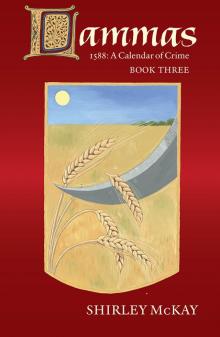 Lammas
Lammas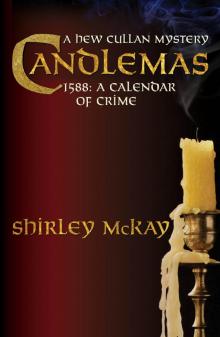 Candlemas
Candlemas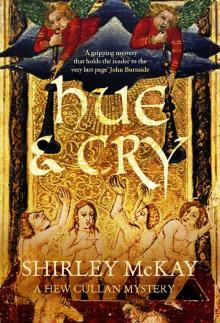 Hue and Cry
Hue and Cry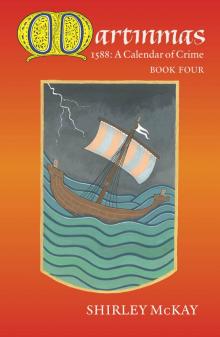 Martinmas
Martinmas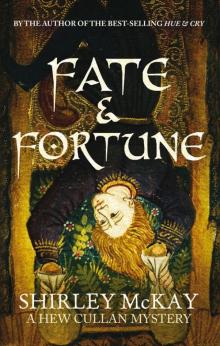 Fate and Fortune
Fate and Fortune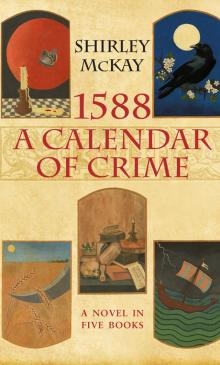 1588 A Calendar of Crime
1588 A Calendar of Crime Time and Tide
Time and Tide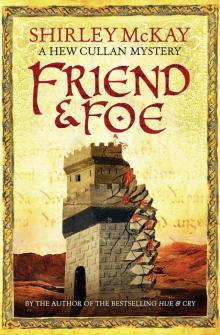 Friend & Foe
Friend & Foe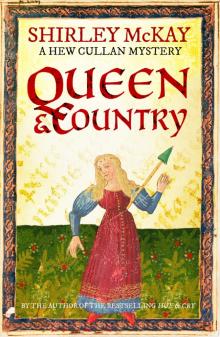 Queen & Country
Queen & Country